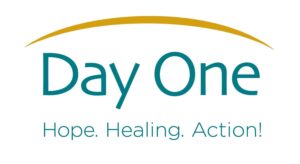Tag: Alexandra Huzyk ’20
Friar’s Best Friend: Understanding the Importance of Service Animals at College
by The Cowl Editor on September 12, 2019
Campus

by Alexandra Huzyk ’20
News Staff
Jacqueline Kelley ’20, owner of the most well-recognized service dog on campus named Moose, says, “He’s definitely my best friend and is the most reliable, always.”
Kelley has had the three-year-old golden retriever for one and a half years now. She said, “He’s given me a good sense of responsibility and has educated me on what it is like to have a service dog.”
The Disability Support Manual states that the College is “committed to providing students with disabilities equal access to programs, facilities, services, and activities at PC. The College will make every effort to provide “reasonable accommodations” so that students can be ensured equal access and work to remove any barriers which may prevent this from occurring.”
When talking about Moose, Kelley shared, “I decided to get a service dog because I was struggling with doing anything independent off campus.”
She went on to explain, “I’ve always felt very helpless and vulnerable, and I felt like I was relying on people to do simple things, like standing up from a seated position. But now I know that Moose is emotionally and physically there for me.”
Moose was previously an emotional support dog for a child who had a lot of aggression, but was removed from that situation because he became the target of that aggression. He was then trained for Kelley as a service dog. She says, “The very first step was just trying to get him used to my scooter, in order to complete tasks like backing up in small spaces.”
The Providence College Division of Student Affairs-Residence Life Policy, states: “The work or task a Service Animal has been trained to provide must be directly related to the functional limitations of the person’s disability.”
“When he’s not working, he’s just a dog like every other dog,” shares Kelley. “If I go into a public building or am on campus, I always keep his vest on and have him working.” Kelley cites that the main difficulty she typically faces on campus is people petting Moose when he is working.
“I’ve never had any problems with professors not wanting him in class,” says Kelley. “Students are pretty open about it, but it is difficult to navigate how to go about being around a person who is afraid of dogs because we both have a right to be somewhere.”
Kelley explained different ways to go about getting a service animal, but recommended that the best way is to go through a service dog company that would certify the animal through Assistance Dogs International.
Through this program, a dog is picked based on a person’s particular needs, and then the dog is trained for that specific person. This particular certificate allows a service dog to be recognized overseas, which is a struggle that Kelley faced with Moose when she studied abroad in Dublin, Ireland.
“He was the biggest help, mainly for emotional reasons. It’s difficult for any person with or without a disability to acclimate to a foreign city,” says Kelley. “With him I felt more confident in going out in the city by myself and taking planes when traveling. He really helped me with my independence.”
Besides being an active member of the Providence College community, Kelley, along with three other students, formed a club named B.E.L.I.E.V.E. (Be Educated, Live with Inspiration, and EValuate Equality).The club discusses issues related to disabilities and works to educate the PC community.
The club welcomes people with or without disabilities, offering a space for people to share their experiences and ask questions.
Kelley hopes that her experiences with Moose, especially abroad, will help her to pursue a career in disability advocacy after graduation. She hopes to attain a masters in disability studies, from either a social or public policy angle. “I would really like to work in urban development to make cities more accessible,” Kelley shares.
Science After-Hours: Friars Conduct Summer Resarch Projects on PC Campus
by The Cowl Editor on August 29, 2019
Campus
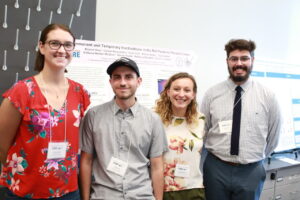
Alexandra Huzyk ’20
News Staff
Throughout the summer of 2019, a variety of different science departments at Providence College conducted multiple research projects.
A few areas of concentration included molecular and evolutionary biology, genetics, neurobiology, population and conservation biology, cancer cell metabolism, stem cell biology, and computational organic chemistry.
In the biology department, Alexis Rabbitt ’20 conducted research with Dr. Pamela Snodgrass-Belt ’91 on the circadian rhythms in Drosophila—commonly known as fruit flies. Rabbitt explains, “A circadian rhythm is the body’s internal clock that controls things like the sleep and wake cycle.”
“My research focuses on the quantification of the expression of the clock, time, and per genes that play an essential role in the regulation of circadian rhythm,” says Rabbitt. The purpose of this research, Rabbitt continues, is to determine how circadian rhythms fluctuate throughout the day and how they affect oxidation rates.
A normal day for Rabbitt included running polymerase chain reactions, freezing flies at different times during the day, dissecting fly heads to extract RNA, and measuring gene expression. “This research has important implications in the lives of shift workers who experience elevated risk of type two diabetes, obesity, and other chronic illness.”
After volunteering in Dr. Snodgrass-Belt’s lab, Rabbitt says, “I chose to do research for class credit and over the summer because I really enjoyed experiencing the more hands-on aspect of biology.” Rabbitt will continue to conduct research throughout the school year, and plans on applying to medical school in the future.
“This research taught me to apply the biology I learn in lecture to real life,” says Rabbitt. “This will help me in the future by allowing me to think of biology on a broader scale, especially when it comes to medicine and applying biological concepts to human patients.”
Kyle Medas ’20, a biochemistry major, became involved in research during the summer following his freshman year. He says, “I chose to do research because I knew that the experience I would obtain from being in a research lab would be much different than a lab from my courses.”
During this past summer, Medas completed his third year of research in Dr. Seann Mulcahy’s lab. Medas says that the focus of this particular lab was to research,“possible strategies to synthesize a class of molecules known as alpha-carbolines.”
Robert Lesch ’20, another student working in Mulcahy’s lab, explains, “The main point of this research is to increase the efficiency of alpha carbs, as all of our work is methodological,” and, “potentially lead researchers into finding applications of alpha carbs as pharmaceuticals.”
“My role in the lab would be to perform the desired reaction, work up the product mixture, then purify the desired product from other side-products,” says Medas. “From here, we analyze the product to determine if it is actually what we want, then move forward with further reactions.”
Medas will continue conducting research within Mulcahy’s lab, and hopes to have his work published. He says, “the experience I have gained from research will allow me to enter future labs with the knowledge of essential techniques.” In the future, Medas hopes to attend graduate school and eventually obtain a Ph.D. in chemistry.
Students who wish to participate in research are encouraged to consult with faculty who specialize in areas that they are interested in.
Discussing the Effects of Anti-Semitism: Dr. Roger Brooks Recognizes the Work of Rev. Edward Doyle
by The Cowl Editor on April 11, 2019
Campus
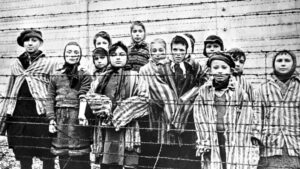
by Alexandra Huzyk ’20
News Staff
On Monday, April 8, a special event was held to commemorate Rev. Edward P. Doyle, O.P.
Commonly referred to as, “Our Dominican Liberator,” Rev. Doyle was a professor of both theology and philosophy at Providence College, and was called to serve as an Army Chaplain and Captain during World War II.
Having donated to the College a collection of personal papers and photographs from his experiences in Germany, featured presenter Dr. Roger Brooks, president and CEO of Facing History and Ourselves, sought to explain the significance of Rev. Doyle’s contribution and legacy.
In 1945, Rev. Doyle and others helped to liberate the Nazi concentration camp in Nordhausen, Germany. While tending to people around him, Rev. Doyle documented what he saw with a Brownie camera.
Upon returning back to the United States, Rev. Doyle resumed his role as a professor at the College and eventually taught at a number of other institutions.
In 1996, shortly before Rev. Doyle’s death, he donated his documentation during the war to PC, which is now held in the Philips Memorial Library. Jane Lunin Perel ’15, Professor Emerita, recalled Rev. Doyle coming to her office and entrusting her with the safekeeping of his work.
“Rev. Doyle wanted to make sure that Providence College students would always know that the Holocaust happened,” began Brooks. As a witness of the terrors of the Holocaust and the heroism of the liberators, Rev. Doyle sought to expose the events of history and cultivate dialogue.
Brooks stated that there are multiple ways to know things. The first being a surface knowledge of facts, and the second being a deeper understanding that comes from experience.
Brooks asserted that this second type of knowledge is what Rev.Doyle wanted for generations of PC students to come “so that they might understand as if these experiences were their own.”
The third type of knowledge, Brooks said, is a deeper wisdom that shapes an individual. This can be seen in the statement that has arisen from the tragedies of the Holocaust, “Never again.”
Unfortunately, since the Holocaust, there have been a number of massacres and genocides. Brooks cited violence against political and religious groups in Rwanda, Serbia, and Myanmar. He asserted that even though the saying, “Never again,” has been promulgated, there still exists hatred and discrimination in the modern world.
“People make choices, and choices make history,” stated Brooks. “We first need to face history, and then we need to face ourselves.”
He emphasized that not everyone was an anti-Semite in Germany during the reign of Hitler, but the amount of people in opposition to these beliefs were not numerous enough to change the course of history.
Reflecting on these historical events, Brooks claimed that every individual must take action to fight against hatred. Rev. Doyle’s way to continue his fight against intolerance, and to prompt global and interreligious dialogue, was to donate his collection of documentation.
Brooks believes that we can incorporate this fight into our everyday life, saying, “the next time you hear a joke that is anti-Semitic, racist, or discriminatory, challenge yourself to be an Upstander. Do the work that Father Doyle called you here for.”
Concluding the event, Dr. Brooks invited PC students Jacqueline Michels ’19 and Ann Kleinschmidt ’19 to discuss the impact that Rev. Doyle has had on their lives. Both students had drawn from Rev. Doyle’s archives for their academic work; a testament to the ongoing impact of Father Doyle’s legacy.
“My dad is Jewish, so learning about the Holocaust was learning about my family’s cultural history,” said Michels.
As for the most inspiring element of Rev. Doyle’s work, Michels said that it was, “his emphasis on hope and how when we study the Holocaust we cannot lose hope.”
Kleinschmidt recalled a particular article in which Rev. Doyle had found out about D-Day, having gotten down on his knees amongst a diverse crowd of soldiers and praying together in their respective faiths.
“Chaplains are doctors of the soul,” said Kleinschmidt. As a future medical student, she said, “I am called to walk with people wherever they are in their lives, just as Rev. Doyle did.”
To Bear or Not to Bear: PC Democrats and Republicans Square Off in Gun Control Debate
by The Cowl Editor on April 4, 2019
Campus
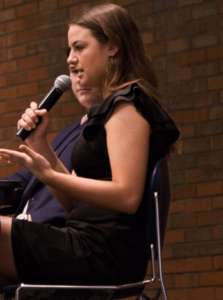
By Alexandra Huzyk ’20
News Staff
On Wednesday, March 27, Providence College Democrats and Republicans held a debate on gun control.
Madison Clark ’19 and Bryan Bates ’20 represented the PC Democrats, while Krista Minniti ’20 and Charlie Dumon ’21 represented the PC Republicans. Dr. Joe Cammarano, a professor of public and community service and political science at the College, acted as the moderator and enforced the structural components of the debate.
The first question that was posed was: “Will gun regulations make a community safer?”
The PC Democrats began with their argument, asserting that statistics have proven that communities with higher levels of gun ownership have higher levels of gun violence per capita.
Clark argued that through the creation of gun regulations, imposing consistent background checks, and restricting open-carry laws, a community would become safer. Bates added to this argument, stating,“Some people say cars are more dangerous than guns. Instead of outlawing them, we regulated them to make sure they are safer for society as a whole.”
In response, PC Republicans argued that gun regulations would not make a community safer.
Minniti argued that a large percentage of reported gun violence was attributed to suicide and illegally owned handguns, which would be attained through the black market no matter the amount of regulations imposed. She used Canada as an example of a country with higher gun rates per capita and lower homicide rates than the U.S. to further emphasize her point that regulations are not the answer to making a community safer.
Dumon took a more radical approach in his contribution, citing the Sutherland Springs Church shooting in 2017. He claimed that, “Deregulations are something that will make the community safer.” Dumon stated that the only thing that ended the massacre was a “good guy with a gun.”
Each side was given one minute to offer a rebuttal to the opposing side’s argument. The Democratic side chose to approach the point brought up in regards to suicide.
Clark stated, “Over two-thirds of deaths related to guns are also related to suicide.” People who choose to use guns for a method of suicide are more likely to actually die, as opposed to those who choose to use pain killers or other methods. Clark concluded that, “reducing the availability of guns has an impact on whether or not a person actually dies.”
The Republican members refocused on the homicide rates, claiming that creating further gun regulations would only cause more people to access the black market. They cited Chicago as a city that has some of the strictest regulations on guns in the country, and yet has a very high homicide rate.
The second pre-determined question that Dr. Cammarano posed was: “How should schools prepare for active shooters?”
The Republicans initiated the debate, beginning with the assertion that schools should have at least one armed officer and there should be training for teachers on how to use a firearem.
Dumon argued that it would be more efficient and beneficial for a teacher to have a gun in order to minimize carnage. He emphasized the amount of time it would take to respond to a shooter without having a gun, by counting the seconds it would take to walk to the fire exit, attempt to get the fire extinguisher, and successfully disable the shooter.
The Democrats argued that instead of giving teachers guns, people should be confronting the motivations and underlying causes of why individuals commit school shootings. Instead of arming staff on school grounds, Clark argued that there should be resources provided to educate teachers on how to resolve conflict without violence.
Clark also asserted that the presence of an armed officer might add to existing tensions, particularly in racially diverse schools. Bates added, “resource officers can be a good asset,” if they are guided on how to use their expertise within schools specifically.
Another question was: “How should the Second Amendment be understood?”
Minniti began the argument for the Republican side by stating that it should be interpreted in the most literal sense. She claimed, “Without the Second Amendment, there is nothing that stands between citizens and anarchy,” for it was initially created for defense against totalitarianism. Tyranny, Minniti asserted, is not a thing of the past.
Dumon elaborated on this tangent, stating, “The Second Amendment was the greatest gift that God ever imposed on the USA,” because it protects all other protections. He cited tyrannical leaders such as Adolf Hitler, Joseph Stalin, Vladimir Lenin, and Mao Zedong who took away peoples’ guns and thus took away their fundamental ability to defend themselves against their government.
Bates began the Democratic argument by stating that the Second Amendment and the Constitution itself “is a living and breathing document.” He argued that if people fail to interpret it in a modern context, we won’t be able to progress as a society. Bates stated that the Amendment was “predicated on the idea of a well-regulated militia,” which they defined as state force.
Both Bates and Clark argued that the Amendment was built to be flexible and to fit the modern age.
Other questions involved how each side defined self-defense, if there should be a universal background check, and if there should be any factors that disqualify someone from the right to bear arms.
Followed by the discussion of these predetermined questions was the opportunity for the audience to submit questions for the panel.
These questions addressed critical topics such as how one can objectively know whether or not a guy with a gun is “good,” whether a teacher should be obligated to use a gun on a student who has a weapon, stand-your-ground laws, and how realistic it is to argue that the Second Amendment protects the right to defend against tyranny when weapons of mass destruction exist.
This debate provided a unique opportunity for PC students to voice their opinions about a divise topic in a civil and engaging manner.
Understanding Homelessness in Rhode Island:Dr. Eric Hirsch Discusses His Recent Research
by The Cowl Editor on February 14, 2019
Campus
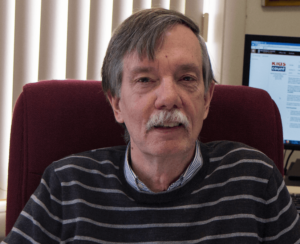
by Alexandra Huzyk ’20
New Staff
Dr. Eric Hirsch, professor of sociology at Providence College, has dedicated his life’s work to the fight for social justice, particularly, acting as an advocate for the homeless.
“When I was at the University of Chicago and taught at Columbia…I did a lot of community organizing and mainly tenant organizing,” said Hirsch. “When I got to Rhode Island, I looked around for similar organizations and there weren’t any. Which raises an interesting question, which is: why are there so few tenant organizations?”
Hirsch explained that according to the most recent data, collected in 2017, there were between 4,000 and 5,000 homeless people identified in the state of Rhode Island.
This number includes every individual who has stayed at least one night in a homeless shelter. However, of this group, about 1,000 people have been homeless for an extended period of time.
“I still think it’s one of the worst things in our society that we allow homelessness to continue, when we know how to end it,” said Hirsch, who believes that ending homelessness is a relatively easy and possible reality.
The solution, according to Hirsch, is to place people in apartments. “What we’ve shown through evaluative research, is that if you put people into apartments and surround them with supportive services,” for disabilities, substance abuse, and mental health, “then we can solve long-term homelessness.”
This conclusion has developed over a period of time, stemming from an initial approach called ‘Housing First.’
This method began in the 1980s and extended into the early 1990s, promoting the building of shelters for the homeless. In these shelters, it is typical that people have no privacy and are often surrounded by people struggling with substance abuse or mental health issues.
After the ‘Housing First’ approach, transitional housing programs were put into place to help transition people from living in shelters to permanent housing. Hirsch said, “We ultimately found that we couldn’t find permanent housing at the end of the two-year program.”
“The state of Rhode Island does very little to provide units, rental subsidies, and support services, unlike other states,” said Hirsch. The Rhode Island government allots $15 per person, which totals an approximate budget of $15,000,000 to provide these necessary resources. In comparison, Connecticut and Massachusetts provide $80 and $100 per capita, respectively.
He cited this lack of funding and the government’s focus on creating tax cuts for the wealthy, as well as trillions of dollars of military spending, as delaying the implementation of resources that can help to end homelessness.
“Our problem is much smaller than other states, but we don’t have the political will to solve it,” explained Hirsch. “The legislature, general assembly, and governor have to hear from their constituents.”
As for public awareness, Hirsch said, “I think there are tons of rationalizations that people have to not feel guilty about poverty and homelessness.”
He said that the most common arguments, that homelessness is attributed to laziness or severe incurable mental illness, are the furthest explanations from the truth. Oftentimes, homelessness is a result of an unfortunate series of catastrophic events occurring in a person’s life.
“I try to make sure people’s stories get out there so that the public can understand the reality of the situation and push for the housing programs that we need.”
Hirsch is currently on sabbatical and has been working to close Harrington Hall Men’s Shelter, a homeless shelter located in Warwick, Rhode Island.
“The shelter is not an acceptable place for people to live,” Hirsch stated. “We certainly have the resources to prevent people from sleeping in a place like this night after night, so why not use the money that keeps the Hall open for rental subsidies and apartments?”
Hirsch further explained that it is cost-efficient to create apartments, as it reduces the staffing costs in shelters and the necessity of emergency medical services.
Besides efforts to transition the men living in Harrington Hall into permanent residences, Hirsch has also been working to create a law that will ban landlords’ discrimination on the basis of income.
For students who wish to become involved in the fight to end homelessness, Hirsch said that he can help connect students with the RI Coalition for The Homeless or a policy committee named The Housing and Homelessness Policy group.
Featured Friars: Colin Williams ’20 and Chris Florio ’20
by The Cowl Editor on February 7, 2019
Features
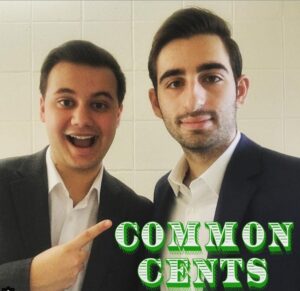
by Alexandra Huzyk ’20
News Staff
Finance is a requirement for all business students, but it does not come easily to everyone. To help make things easier, Providence College students Colin Williams ’20 and Christopher Florio ’20 have created a podcast named Common Cents.
The podcast aims to teach people about what is going on in the world financially.
Florio, an accounting and finance double major, says that the podcast is “a look at how world news shapes financial markets, how individual events affect the business world, and our take on them.”
“We get that these topics are boring to most people, so we try to add in a joke now and then,” says Williams, a finance major with an accounting minor.
The two students, who met each other freshman year, decided to create the podcast because it was something that personally interested them. As for choosing a podcast as opposed to another form of media, Williams joked, “I personally have a face for radio.” To which Florio responded, “Hey, that’s my line.”
Both Florio and Williams feel that podcasts are appealing to people with busy lifestyles and have had a recent resurgence in popularity. Williams says he has noticed podcasts becoming popular assignments within classes and an alternative for listening to music while at the gym.
Besides the obvious growth in popularity, Florio also added that they decided to create podcasts because “we’re going to have the conversation anyways, so we might as well record it.”
As for the catchy title, Williams, the self-proclaimed king of puns, said, “The name kind of just came to us.”
Florio and Williams explained that their podcasts are meant to appeal to college students. The episodes are especially relevant to business students that will be going through the interview process. “If you’re interviewing, you need to have some basic knowledge of what’s going on around you,” said Florio.
Williams added that listening to their podcasts is a good alternative to reading a newspaper, as it is an easy way to stay up-to-date on the particulars of financial markets and business-related news.
Of their three podcast episodes, Williams says that the pilot episode was his favorite. Florio says that the second episode was his personal favorite because they were able to talk about investments and real estate.
In addition to their current episodes Florio said, “hopefully, we’d like to think about putting a podcast out every two weeks, but we’ve found that we’re kind of tied to what happens in the world.” Williams said that in the future “we want to expand our audience, so that we teach and inform more people about what’s going on.”
For readers looking for more podcasts in the financial or business sphere, Williams suggests listening to Motley Fool Answers, which “delves into financial planning, retirement, and saving for college.”
His other suggestion is How They Built This, in which, “the hosts meet with CEOs of big companies and talk about how they got to be where they are now.”
Besides working on their podcast, both Florio and Williams hope to pursue jobs within their respective business interests after their time at PC. Florio has a job lined up in public accounting following graduation.
Williams said, “For me, the end game is to do financial planning. What I’m most interested in is retirement planning.”
For more jokes and financial commentary, tune in to the duo’s podcast on SoundCloud or Apple Podcasts (both under Common Cents), which will most likely have its most recent podcast uploaded on Monday, February 11.
Students should also follow their Instagram (@common.cents.363) for the latest market news and accounting updates.
Agency to End Abuse Sets Up On-Campus Training
by The Cowl Editor on January 24, 2019
Campus
by Alexandra Huzyk ’20
News Staff
Throughout the month of February, Providence College will be holding training sessions on sexual assault, hosted and conducted by a Rhode Island agency called Day One. The training is open to all members of the PC community, as well as anyone else in the area who is interested.
Day One is an agency that seeks to reduce sexual abuse and support those who are affected. Day One states on their website, “We provide treatment, intervention, education, advocacy, and prevention services to Rhode Islanders of all ages—from preschool children to elder adults.”
Along with these services, Day One approaches the problem of sexual abuse in a transformative manner by advocating for systemic changes like public policy initiatives.
Day One recognizes the seriousness of sexual assault on college campuses and works with schools like PC to train students and to initiate dialogue amongst the community.
Dr. James Campbell, assistant vice president for student development and compliance, says that the agency periodically offers these trainings, which “prepare volunteers to serve on the Day One Helpline or serve as advocates for assault victims.”
“We believe it would be a good experience for students who may be interested in serving victims of sexual assault and domestic violence,” said Dr. Campbell.
The training itself will educate on gender-based violence, such as the various types of sexual abuse and violence, which is defined by Day One as something that “occurs any time a person is forced, coerced, and/or manipulated into any unwanted sexual activity. Force is not just physical force or violence, but includes physical and verbal pressure, tricks, bribes, and threats.”
Other topics that will be covered during this training are the different resources available to students and the rights of students under acts such as Title IX, which is coordinated at PC by Dr. Campbell.
Brianna O’Shaughnessy ’19 is the founder of RISE (Reclaim-Inform-Support-Empower) and hopes that “this training will provide students with the basic knowledge and tools to use so they may engage in action and activism on their own and in their own way and continually learn and improve their understanding of this topic.”
RISE is “a student run sexual assault education and action group working with survivors, allies, administration, and all students to work towards solutions for sexual violence on campus.”
O’Shaughnessy says she was inspired to create this group after her study abroad experience, where she realized that many others schools had this type of an outlet and resource available for their students.
Upon her return to the College, O’Shaughnessy decided to create this group in order to inspire action and change on the College’s campus. “We are dedicated to creating a space where survivors can be supported and can reclaim their voice and be empowered,” says O’Shaughnessy.
If any students are interested in joining RISE, email boshaugh@friars.providence.edu or follow the group’s Instagram (@providencecollegerise).
Father Dom Gives His Final Farewell
by The Cowl Editor on May 3, 2018
Campus
Friar Gives Last Bit of Advice Before Leaving for Notre Dame
by Alexandra Huzyk ’20
News Staff
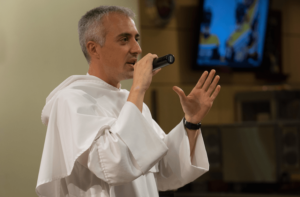
On Wednesday, April 25, Father Dominic Verner, O.P., was met with applause after he gave the very last Theology on Tap of the academic year. The talk served as Fr. Dom’s farewell speech before he leaves for the University of Notre Dame to pursue a PhD. In the speech, he gave the audience five rules to follow in order to see him again; if not in their lifetimes, then in heaven.
“I like having a microphone but I don’t like goodbyes,” said Fr. Dom. “I think we’re made for eternity, for unending relationships, unending friendship.” With this thought in mind throughout his speech, Fr. Dom proceeded to give the audience a “parting gift” of how to see him again in heaven.
The first rule that he divulged to the crowd was “you’ve got to intend to get to heaven.” Heaven, he said, must be the final destination that each person must have in mind. He made a comparison between stumbling into McPhail’s and specifically intending to be there for his talk. Fr. Dom said, “Your soul is like Google Maps and you’ve got to set the destination,” because it would be a bit awkward to stumble into heaven and also into God.
The second rule Fr. Dom gave was: “Get to know the host, the owner of the house.” He said that it would be awkward if a person were to come across God and not know Him.
Then, Fr. Dom proceeded to ask a student in the audience if she had ever “Insta-stalked” anyone and then happened upon them in person. In this case, you know the person but they are unfamiliar with you. He said that this was similar to walking into heaven and not having a mutual understanding between oneself and God.
The third rule is to RSVP to the invitation that God has sent to everyone, inviting them to heaven. “Jesus died in order for us to get that invitation,” Fr. Dom said. He also shared that although confronting and accepting this might be hard, it is necessary.
The fourth rule is to “follow the directions,” to get to heaven and to ultimately get to God. After setting the destination to heaven, it is necessary to follow the directions and not to stray on a route that may lead you elsewhere. To successfully get to heaven, one’s goal, Fr. Dom said, “follow directions, obey the Ten Commandments, and do good.”
Lastly, Fr. Dom shared the fifth rule to see him again. This rule is to “get good copilots that can keep you alive and awake.” This is to keep one on the path towards God and to help in one’s pursuit of heaven. Copilots are necessary, he says, because “someone has to encourage your soul to be the best it can be.”
Fr. Dom’s talk concluded with questions from Father Bonaventure Chapman, O.P., and students in the audience. Fr. Bonaventure asked Fr. Dom what one thing he could have told himself about God prior to his Priesthood. Fr. Dom responded, “I would say, ‘do not be afraid,’” and “be more courageous, trust God more, and be more confident in what he’s done and what he’s doing for you.”
One student asked how he had decided to dedicate his life to God by becoming a priest. Fr. Dom shared that initially, he wanted to become an engineer and have a family. But, in college, he discovered that he experienced the most joy discussing profound questions about human life and Jesus. He said, “Long story short, I began to feel this desire to give everything to the Lord in a radical and frightening way.”
Social and Political Activist Obianuju Ekeocha Visits PC
by The Cowl Editor on April 19, 2018
Campus
“Neocolonialism in Africa: Repeating the Past but Worse”
by Alexandra Huzyk ’20
News Staff
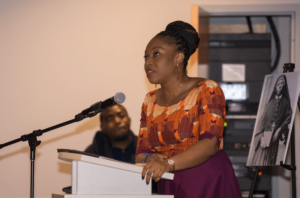
In between visits to Washington, D.C., and the Canadian Parliament, Obianuju Ekeocha, a Nigerian social and political activist, gave a talk to the Providence College community titled “Neocolonialism in Africa: Repeating the Past, but Worse.” Ekeocha talked about the ideological neocolonialism that donors use in their funding strategies within Africa.
Ekeocha began the lecture by providing brief demographic and historical context of Africa as a continent. Africa is composed of 54 countries and is home to one billion people, with around 3,000 native languages spoken. Ekeocha said that although there are many different tribes and ethnic groups and no one true African culture, “there are common threads that run through the various African countries.”
Ekeocha also explained that colonialism in Africa began at the Berlin Conference, which took place in 1884. This conference is known as the “Scramble for Africa.” At the Berlin Conference, the European powers of the 19th century divided up African land for colonization. Ekeocha said, “Great Britain was the greatest colonial power, as well as France.”
This period of colonization, which lasted between 70 and 75 years, “was really about geopolitical domination.” In the 1960s, African countries were granted their independence from their respective European colonists. Ekeocha explained that since then, Africa has developed various problems in the areas of economy, politics, security, infrastructure, development, and healthcare. As a result of these struggles, donors come in to give money and resources. Some countries, Ekeocha says, “are addicted to the foreign aid and the opulence that the donors have to give.”
Ekeocha also explained that this relationship between donor and country creates a power imbalance. The African countries believe that the donors are coming in as friends and as equals, which is not the case. “They are coming with very clear definitions and views of the world that are not necessarily ours,” Ekeocha said. “They define for us what is human life and what are human rights.”
Donors also determine what is worth funding, without necessarily considering the real problems at hand or the input of citizens. Ekeocha said, “Donors are completely blind and deaf to everything that we hold dear,” including rich African culture. When countries do not comply, leaders are shamed and punished.
To elaborate on this power imbalance, Ekeocha revealed that a startling amount of funds are given to what are called population programmes. “This includes all aspects of sexual reproductive health and rights [SRHR] like contraceptives, condoms, comprehensive sexuality education, and abortion,” Ekeocha shared. She also explained that most of the funding that is given to these population programmes pays for expensive billboards and contraceptives which have debilitating side effects.
After, Ekeocha showed the audience graphs depicting the percentages of aid from the U.S. and the UK which are allocated to SRHR; 31.4 percent and 43.8 percent, respectively. In comparison to the funds given to population programmes in all other areas of the world, Africa receives much more in this particular sector. “This is exactly what I would define as phenotropic racism,” said Ekeocha.
Funding for population programs also goes towards providing resources for abortion and advocacy. “In Africa there are only 4 countries that have legalized abortion and those are south Africa, Tunisia, Cape Verde, and Mozambique,” Ekeocha said. Countries have the legal capacities to legalize abortion, but oftentimes choose not to because it conflicts with the public’s opinions. “There is that strong protective instinct in Africans,” she said, which can be reflected in one’s feelings regarding abortion.
Ekeocha emphasized the fact that women are speaking out, and yet donors continue to ignore their thoughts and cultural beliefs. In this way, Ekeocha says, “Our donor has become our master,” for their donors foster a sense of paternalism and contribute to ideological neocolonialism.
The lecture concluded with a sneak peek of a documentary that Ekeocha is working on named Strings Attached.
Inside Mental Illness Event Calls to Reduce Stigma
by The Cowl Editor on April 12, 2018
Campus
Students Gather to Hear Stories of Hope and Support
by Alexandra Huzyk ’20
News Staff
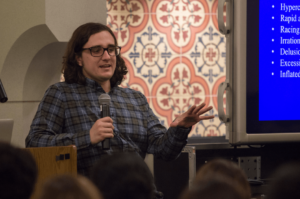
What initially started in 1979 as a support group for mothers with children who had been diagnosed with schizophrenia, has become what is known as the National Alliance on Mental Illness (NAMI). This organization now offers various programs and services, including support groups and classes, for people who have been diagnosed with various forms of mental illness as well as their family members.
On Wednesday, April 4, an event was held by Active Minds, the psychology department, and the Personal Counseling Center. Members of the Rhode Island Chapter of NAMI came to Providence College to educate students about the stigma surrounding around mental illness and provide testimonies of hope. Three speakers shared their respective experiences with bipolar disorder, anxiety, and schizophrenia.
“Mental illnesses are biological, and often hereditary, so it’s not as if you’re making a conscious decision to become sick,” said one of the presenters. Oftentimes, traumatic situations can trigger the symptoms of mental illnesses. Onset symptoms usually occur in people who are between the ages of 18 and 25.
The first speaker, Seth Akers-Campbell, is a current graduate student at Brown University who has been diagnosed with bipolar disorder. He said that when he was younger, he had no particular reasons to be depressed, but he was. He shared that he channeled his emotions into his schoolwork and sports, and so his symptoms went unnoticed for a long period of time. In his sophomore year of college, his depression was triggered by a long snow storm. He described his symptoms as, “the loss of all motivation, the inability to get out of bed,” and that eventually, “death takes over your whole brain, it’s all you think about.” After this occasion, he finally sought out help and was diagnosed with major depressive disorder.
However, the medication that was prescribed to Akers-Campbell was ineffective and he suffered from constant side effects. Akers-Campbell said, “About a year later, after I began my medication, I snapped, and that was my first manic episode.” As a person who has bipolar disorder, Akers-Campbell has episodes of both depression and mania. “It’s the opposite of depression,” Akers-Campbell says about mania. “You always have to be doing something, even if that means not getting any sleep. You don’t get the usual negative reinforcement, so you don’t feel bad and so nothing ever tells you to stop.” After a long road of trial and error with various medications, he says that he finally found a combination that subdues his symptoms and allows him to live his life.
One student asked Akers-Campbell what they should do if they think a friend might be mentally ill. “The best thing that you can do as a friend is get them help,” Akers-Campbell said in response. “You may think that they will hate you for a little bit, and they will, but then they’ll love you forever.”
Another speaker, Lea Knizek ’17, shared her experience with anxiety. She said that her symptoms were triggered during a rough start on the first day of high school, when she experienced a panic attack for the first time. “My heart was beating so, so fast and my skin felt like it was ripping off and my bones were breaking,” she recalled. After going to the nurse and being sent back to class, she ignored her symptoms and chose not to tell her parents because she felt that they would be disappointed in her. In order to combat what she felt, Knizek says that she always kept busy, but, “I was so drained that I couldn’t live in the present moment and was constantly thinking about what could go wrong.”
After graduating high school and choosing to attend PC, Knizek says that her symptoms returned and she developed an eating disorder. She was so nervous to talk during her Development of Western Civilization seminar that her grade plummeted and she received a letter that she was on academic probation. On top of this, she began to withdraw from her friends, quit dancing, became obsessed with going to the gym, and almost stopped eating entirely. She says that when things got really bad, one of her friends sat her down and she was able to share everything that she had been suppressing for so long. Her friend urged her to go the Counseling Center, and so she went. Although she did not enjoy going to counseling at first, Knizek shared that she was able to talk to someone without judgement and that she learned different techniques to manage her anxiety.
The last speaker, Walker Goncalves, shared his story about living with schizophrenia. He recalled having heard voices, always being paranoid, and being depressed. “When I went to school, the voices started accumulating and I started doing horrific things,” said Goncalves. After struggling to graduate high school and to maintain a steady job, Goncalves continued to have trouble controlling his emotions. When he was 24, he was jumped and called the Providence Center, a mental health facility, asking for help and saying that he wanted to get revenge on all of the bullies in his life. He was mentally evaluated, and was diagnosed with schizophrenia.
“I started a whole new life after I got my medication,” said Goncalves. “I don’t think it’s a burden being schizophrenic, I think it’s a gift from God that I can go around and talk to people.”

